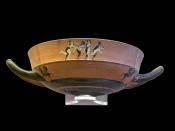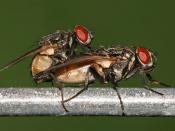Science is advancing at a very speedy rate over the last few years. It has advanced so much that it can now produce babies without making a couple to have sexual intercourse!!
There are a lot of problems about infertility amongst women. About 20% of the women in the world are infertile or they can't have babies. This can result in a great depression or emotional disturbance amongst the infertile women.
Science has now found a solution, or shall we say solutions to this problem. You can now have your baby without adopting one, i.e. the baby will have all the characteristics or genes of its parents.
The following are some of the treatments available to help infertile couples and also how it is done:
(i) In-Vitro-Fertilisation (IVF):
In this treatment, an egg is released from the ovary and united with a sperm. This union, which is called fertilisation, takes place in a test tube in a laboratory which provides correct conditions for fertilisation.
If the fertilisation is successful, the embryo is then transferred to the womb of the mother, where its growth continues.
(ii) Artificial Insemination by Husband (AIH):
In this treatment, the egg of the mother is not extracted from her body. The husband's sperm is taken and is then injected into the mother's egg by medical means.
(iii) Artificial Insemination by Donor (AID):
This treatment is the same as the AIH, except that the sperm is from an unknown person, or a donor, i.e. the sperm of a donor is injected into the mother's womb by medical ways.
(iv) Egg Donation:
In this treatment, the husband's sperm is extracted and then it is fertilised with the egg of an unknown woman (donor) by the method of IVF and then it is placed into the mother's womb.
(v) Embryo Donation:
In this process, both the sperm and the egg are from unknown persons (donors), which are fertilised by the method of IVF and then placed into the womb of the mother.
(vi) Surrogacy:
This process is a complicated one, although it's the same the previous ones. In this treatment, their takes place either IVF or AIH or AID.
(vii) Intrauterine Insemination (IUI):
In this treatment, the sperm of the husband is taken and is processed. It is centrifuged and then only the sperms which are mobile and perfect are taken. These selected sperms are then injected into the mother's womb.
(viii) Gestational Surrogacy (Host Uterus, Host IVF):
Gestational Surrogacy (also known as host uterus) is an infertility treatment appropriate when a couple can form normal embryos but it is medically desirable or necessary for these embryos to develop within the womb (uterus) of a gestational carrier (host) rather than the biologic mother (egg donor). Gestational surrogacy (host uterus) can be a highly effective treatment but, as with conventional IVF, success cannot be guaranteed.
(ix) Embryology:
During IVF treatment, women are given drugs to help them produce more eggs - sometimes as many as 20 at a time. As a result, spare embryos are produced. By carrying out research on these embryos, doctors can improve the success rate of IVF. This research carried out on embryos is called Embryology.
All the treatments mentioned above are controversial, in a religious as well as ethical way. Let us see what attitudes different religions develop for these treatments.
Christians:
All Christians encourage infertile couples to adopt children. This is because it is a virtue to take a child who doesn't have parents and give him a life which he/she would never have got if he was not adopted.
Let us see Christian attitude towards these treatments.
There are two Christian views on fertility treatments:
1.Roman Catholics and a few Christians oppose and ban all forms of embryo technology. This is because of the following reasons:
(a)The treatments involve fertilisation taking place outside the body of the mother, i.e. it is not a part of the sex act, and God intended procreation to come from sex;
(b)The method of IVF requires the creation of embryos, and the embryos which are not used, or are not useful are thrown away. This means that the organism in the embryo is killed.
Also, according to the Catholic Church, IVF and AI treatments are acceptable as long as:
(a)spare embryos are not produced
(b)the sperm and embryo belong to the married couple and is not donated by a third party
(c)IVF and AI are not used to replace the act of sexual intercourse in which husband and wife express their love.
"Artificial Insemination (AI) is different from natural intercourse. AI violates the dignity of the person and the sanctity of marriage. It is therefore contrary to the Natural and Divine Law. In an address to Catholic doctors, Pope Pius XII condemned AI. It is condemned because a third person becoming involved in a marriage is like "mechanical adultery": the donor fathers a child (with his sperm) yet he has no responsibility to the child; and a process that isolates the sacred act of creating life from the marriage union is a violation of the marriage union (which alone is the way to create life). However, if the marriage act is preserved, then various clinical techniques designed to help create new life are not to be condemned."
Adapted from Modern Catholic Dictionary.
This quote briefly describes the attitude of Roman Catholics towards treatments available to help infertile couples to have children.
The Catholics do not accept the concept of AID as they think it is the same as committing adultery. The donor who donates the sperm will have no responsibility to his own child. They also think that the only way to create life is by sexual intercourse between husband and wife, and AI violates this act. But they also say that if this marriage act is preserved, then all the clinical techniques used are accepted.
2.Other Christians accept the treatment of IVF and AIH because:
(a)the egg and sperm are from the husband and wife, i.e. there is no involvement of third party, or a donor;
(b)technology used is for giving the couples the pleasure of having children, i.e. it is the only possible way for the couple for having children.
"The Division of the Methodist Church which is responsible for advising the Church on medical ethics agrees that embryos up to fourteen days old can be used for infertility treatments and medical research."
Statement of the Methodist Church in What the Churches Say.
This quote explains that the Methodist Church is in favour of the treatments to cure infertility as long as the embryos used are not more than fourteen days old, as after fourteen days, the embryos develop into a foetus, which is a living being, and killing it means killing a human being.
Islam:
Most of the Muslims accept the treatments of IVF and AIH because of the following reasons:
(a)the egg and the sperm are extracted from the husband and wife, i.e. they do not accept the concept of surrogacy as Muslims believe that procreation is only allowed within a legally binding marriage;
(b)family plays a very important role in the life of Muslims. So they accept the treatments as long as it is for producing a family;
(c)they say that the unused embryos do not become foetuses till they are 14 days old. So they believe that destroying these embryos do not mean killing of the baby or abortion.
"As long as the husband's semen is used, it is permissible for doctors to use artificial means to fertilise the wife's egg."
- Articles of Islamic Acts, Imam Al-Khoei
This quote again explains that Muslims are strictly against surrogacy. According to them, one can use the treatment for producing babies as long as the egg and sperm come from the baby's original parents.
Islam is totally against any form of embryo technology. This is because of the following reasons:
(a)they believe that if the child is born by embryo technology, either the sperm or the egg will be from an unknown donor. This means that the child will be born and will die without knowing who his natural parents are, and the child has the right to know this;
(b)if a child is born by embryo technology, he will not have the same characteristics or features as his parents. This means that the child will not be their own, which is the same as adoption, which is banned in Islam.
Thus, both Christians and Islam are in favour as well as against the treatments to help infertile couples to have children.
The two religions have a lot of common points of arguments.
They accept some treatments whereas oppose the others.


